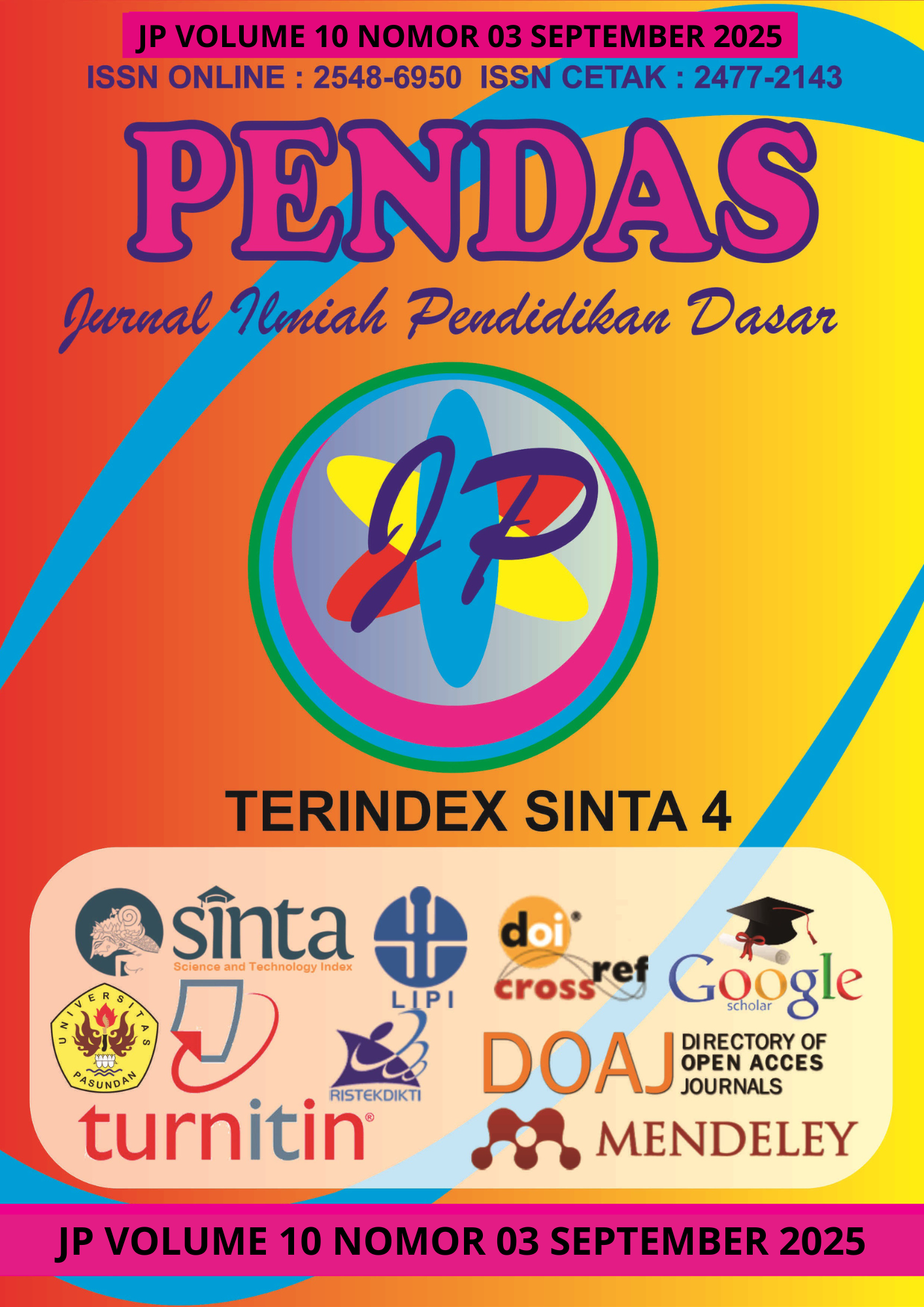PENGARUH MODEL PEMBELAJARAN PROBLEM BASED LEARNING (PBL) TERHADAP KEMAMPUAN KOMUNIKASI MATEMATIS SISWA KELAS 4 DALAM MATERI PECAHAN PADA MATA PELAJARAN MATEMATIKA DI SDN MERUYA SELATAN 03 PAGI
DOI:
https://doi.org/10.23969/jp.v10i03.30810Keywords:
problem based learning, mathematical communication, fractionsAbstract
This research aims to investigate the effect of Problem Based Learning (PBL) on the mathematical communication skills of fourth-grade students in the topic of fractions at SDN Meruya Selatan 03 Pagi. The background of the study highlights students' common difficulties in expressing and understanding mathematical concepts, particularly in fractions, due to conventional teaching methods. To address this issue, the study implemented the PBL model, which emphasizes student-centered learning through real-world problem solving, collaboration, and active discussion. The research used a quasi-experimental design with two groups: an experimental group taught using PBL and a control group taught conventionally. Data were collected through pretest and posttest assessments using essay-type written tests that measured mathematical communication skills. The sample consisted of 64 students, divided equally between the two groups. Data analysis included N-Gain calculation, normality and homogeneity tests, and hypothesis testing using the t-test. The results revealed that students in the experimental group achieved a higher N-Gain score (0.55 moderate to high category) compared to the control group (0.23 low category). These findings suggest that the PBL model significantly enhances students' ability to communicate mathematical ideas orally and in writing, understand visual representations, and relate mathematical concepts to real-life situations. Therefore, PBL is recommended as an effective instructional model to improve mathematical communication skills in primary education, especially in the context of teaching fractions.
Downloads
References
Aisyah, S., Juandi, D., & Jupri, A. (2022). Implementasi model problem based learning terhadap kemampuan koneksi matematis siswa. Jurnal Pendidikan Matematika Indonesia, 7(1), 18–27. http://download.garuda.kemdikbud.go.id/article.php?article=2830222&val=7291
Binjai, S. B. (2019). Pengaruh model pembelajaran problem based learning terhadap kemampuan komunikasi matematis siswa kelas VIII SMP Negeri 2 Salapian. Jurnal Serunai Pendidikan Dasar, 1(2), 112–119. http://download.garuda.kemdikbud.go.id/article.php?article=1296319&val=17445
Edistria, E. (2020). Pengaruh hypnoteaching dalam problem-based learning terhadap kemampuan komunikasi matematis siswa. Jurnal Pelangi, 12(1), 23–30. http://download.garuda.kemdikbud.go.id/article.php?article=1644399&val=14734
Fatimah, F. (2012). Kemampuan komunikasi matematis dalam pembelajaran statistika elementer melalui problem-based learning. Cakrawala Pendidikan, 31(3), 355–366. http://download.garuda.kemdikbud.go.id/article.php?article=1507156&val=445
Hodiyanto, H. (2017). Kemampuan komunikasi matematis dalam pembelajaran matematika. AdMathEdu, 7(2), 128–134. https://www.researchgate.net/publication/330086310
Manurung, R. R. (2018). Upaya meningkatkan kemampuan komunikasi matematis siswa pada materi kubus dan balok melalui model problem based learning. Journal on Education, 1(2), 89–96. https://www.researchgate.net/publication/376311052
Sembiring, F., & Surya, E. (2024). Pengaruh pembelajaran berbasis masalah terhadap kemampuan komunikasi matematis siswa SMA. Jurnal Pendidikan Matematika, 8(1), 1–10. https://www.researchgate.net/publication/376481487
Setiawan, Y., & Ati, T. P. (2020). Efektivitas problem based learning-problem solving terhadap kemampuan berpikir kritis dalam pembelajaran matematika. Prima: Jurnal Pendidikan Matematika, 4(1), 11–21. http://download.garuda.kemdikbud.go.id/article.php?article=1631651&val=13403
Sihombing, T. N. (2020). Meningkatkan kemampuan pemecahan masalah matematika melalui model problem based learning. Jurnal Cendekia: Jurnal Pendidikan Matematika, 4(2), 389–401. https://www.researchgate.net/publication/341458850
Silvi, F., Witarsa, R., & Ananda, R. (2020). Kajian literatur tentang kemampuan pemecahan masalah matematika dengan model problem based learning pada siswa sekolah dasar. Jurnal Pendidikan Dasar Perkhasa, 6(1), 66–75. http://download.garuda.kemdikbud.go.id/article.php?article=2047067
Simamora, E. F., & Medan, J. (2019). Meningkatkan kemampuan komunikasi matematis dengan model pembelajaran problem based learning. Jurnal Pendidikan Matematika, 6(2), 92–100. https://www.researchgate.net/publication/337672607
Sugiarti, S. (2014). Pengaruh model pembelajaran berbasis masalah terhadap kemampuan koneksi matematis siswa. Jurnal Pendidikan Matematika UNPAS, 8(1), 1–10. http://download.garuda.kemdikbud.go.id/article.php?article=1972689
Wahida, F., & Andriyani, A. (2022). Keefektifan model problem based learning dalam meningkatkan kemampuan koneksi matematis dan keaktifan belajar materi peluang. Formosa Journal of Science Education, 1(4), 14–22. http://download.garuda.kemdikbud.go.id/article.php?article=2924672
Wulandari, F., & Koeswanti, H. D. (2021). Meta-analisis penerapan model pembelajaran problem based learning terhadap motivasi belajar siswa sekolah dasar. Jurnal Pendidikan Sekolah Dasar, 7(2), 55–63. http://download.garuda.kemdikbud.go.id/article.php?article=2253973
Zainil, M., & Melinda, V. (2020). Model project based learning untuk kemampuan komunikasi matematis siswa sekolah dasar: Studi literatur. Jurnal Pendidikan Matematika, 9(2), 99–108. http://download.garuda.kemdikbud.go.id/article.php?article=2046852
Downloads
Published
Issue
Section
License
Copyright (c) 2025 Pendas : Jurnal Ilmiah Pendidikan Dasar

This work is licensed under a Creative Commons Attribution 4.0 International License.














































